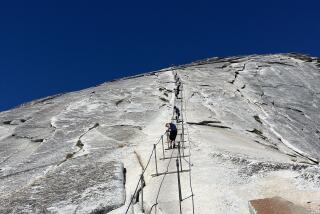4 Paraplegic Climbers First to Scale Mt. Shasta
SACRAMENTO — SACRAMENTO -- A four-member disabled climbing team made history early Saturday, becoming the first paraplegic climbers to reach the 14,162-foot summit of Mt. Shasta.
The team of climbers, each disabled in previous skiing, car or climbing accidents, reached the snowcapped Northern California peak Saturday morning, said climber Muffy Davis, 29, of Sun Valley, Idaho.
“We’re there. We’re on the summit calling from Mt. Shasta. We are on top of the world,” said Davis, a medal-winning member of the United States Disabled Ski Team.
Davis suffered back injuries in a 1989 ski accident.
“We’re still celebrating,” she said, while standing on the summit. “Everyone is just high in general.”
The group and its support team, 20 people in all, ascended the mountain in a seven-day, 4.5-mile climb using “snow pods,” hand-cranked machines similar to mini-tractors.
The machines, developed by Peter Rieke, 48, of Pasco, Wash., a disabled climber who joined in on the Shasta ascent and owner of Mobility Engineering, are expected to open mountaineering to more climbers with disabilities.
Rieke, who broke his neck and back during a 1994 climb, developed the snow pods over six years with help from friends. In 1998, he scaled Oregon’s 11,240-foot Mt. Hood.
Other climbers to reach the top of Mt. Shasta Saturday included Mark Wellman, who has climbed El Capitan and Half Dome in Yosemite National Park, and Keegan Reilly, who reached the summit of Colorado’s 14,433-foot Mt. Elbert last summer.
Wellman, 42, of Truckee, a former national park ranger, suffered a spinal cord injury in a 1982 climbing accident. His 1989 ascent of 3,000-foot El Capitan with climbing partner Mike Corbett, during which Wellman pulled himself up the mountain by hand, received international attention.
Reilly, 21, of Eugene, Ore., an Oregon State University student, the youngest member of the climbing team, lost the use of his legs after a 1996 car accident.
Davis said the team began its final ascent at 7 a.m. Saturday. The climbers, who carried messages of support from around the world, spent the night about 1,200 feet below the mountaintop.
Davis said the group planned to spend the day on the summit and begin its descent today, using the snow pods.
“I’m looking forward to a nice shower, washing my hair, and a nice cold beer,” she said.
More to Read
Sign up for The Wild
We’ll help you find the best places to hike, bike and run, as well as the perfect silent spots for meditation and yoga.
You may occasionally receive promotional content from the Los Angeles Times.






